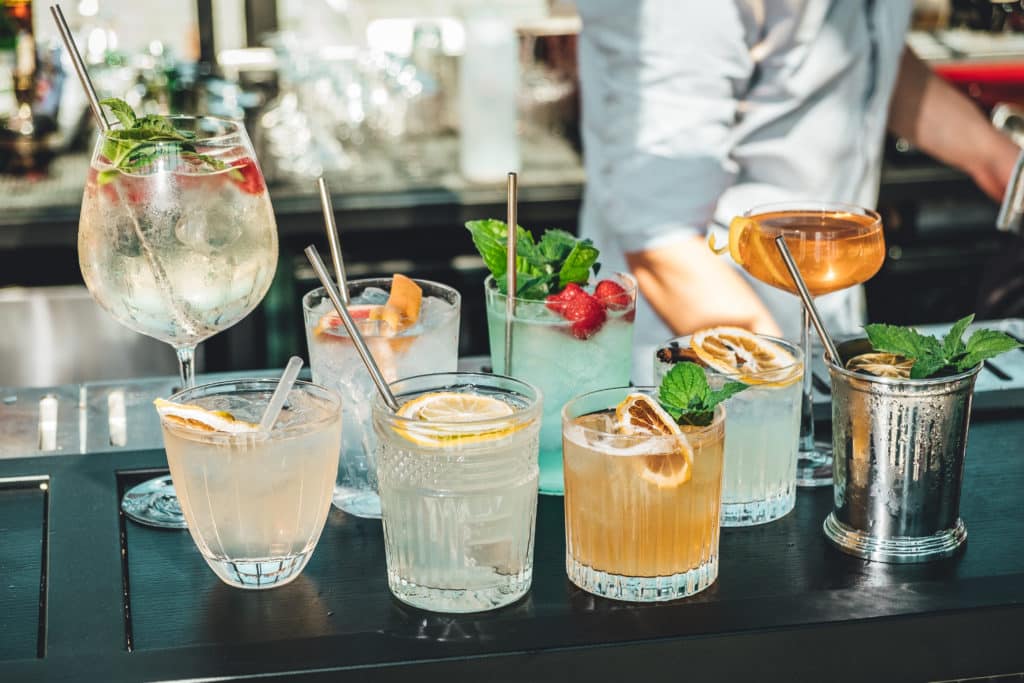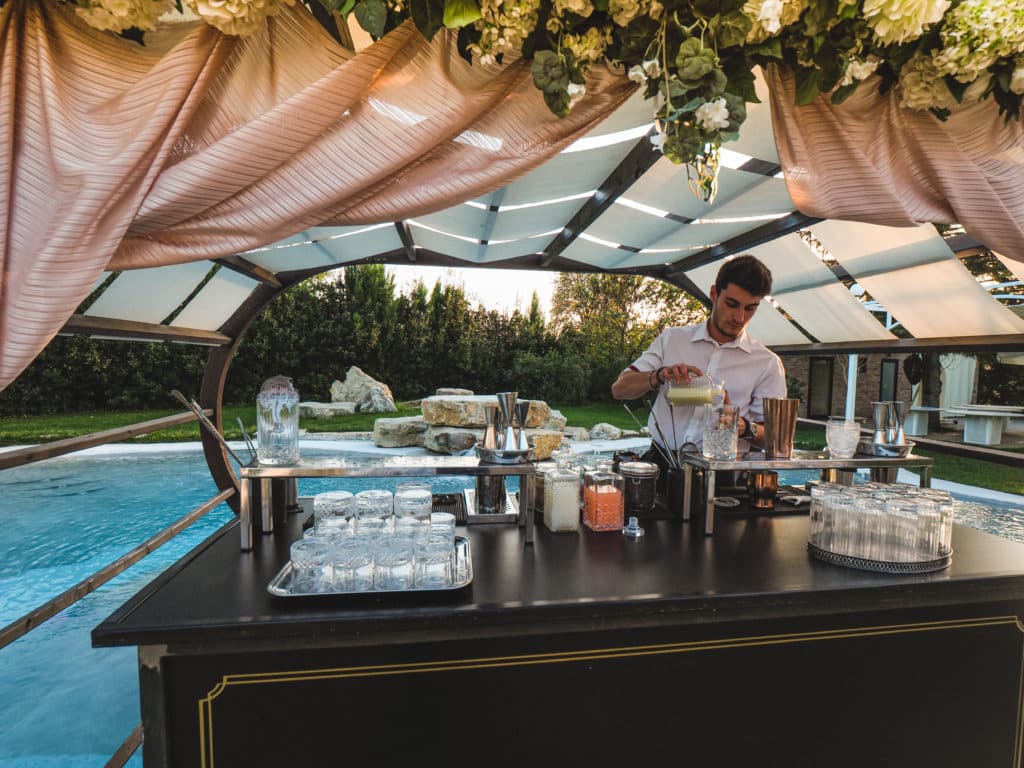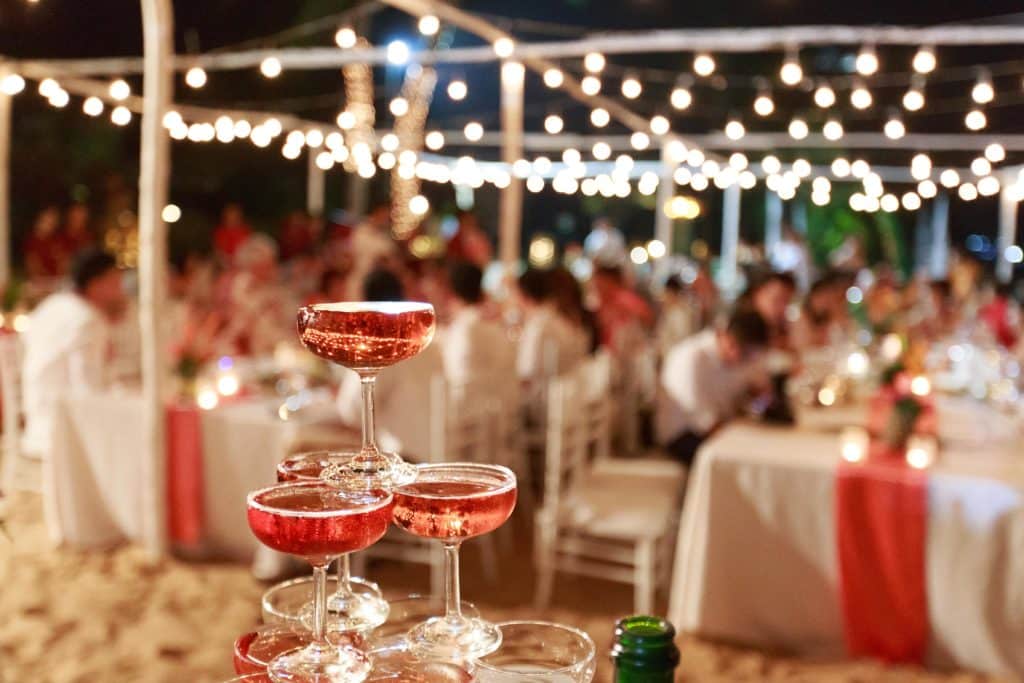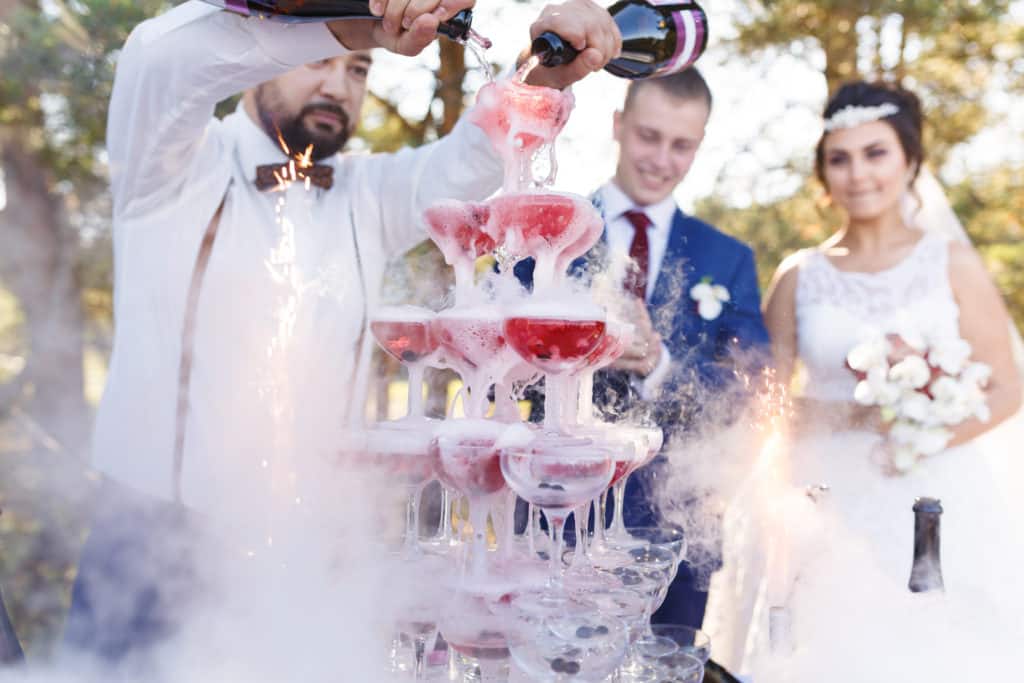Did you know that 67% of Americans enjoy when couples serve alcohol at their wedding receptions? As a result, there’s a solid demand for wedding bartenders in the U.S. Many private bartenders love working weddings—everyone tends to be in a good mood and the drink orders are often pretty simple, making your job easier!
If you’re interested in booking weddings for your private bartending business, look no further! In this handy guide, we’ll cover the most important steps you need to take to get started, from making sure you’re properly licensed to landing clients.
Read on for our top tips and start your wedding bartending journey today!
1. Get Your Liquor License
If you’re just starting out with your bartending business, you’ll need to begin by getting a liquor license in order to legally sell and serve alcohol. Depending on where you live, the process for getting a liquor license and what documents you’ll need to submit will differ, so it’s important to check with your state’s liquor board.
While the exact requirements may differ from state to state, the process for getting licensed should look something like this:
- Start your application: Because processing can take several weeks, it’s important to begin the application ASAP or else you may need to pay expensive expediting fees. The sooner you submit it, the sooner you can start bartending at weddings.
- Determine which license you need: Did you know that some states have liquor licenses that are specific to certain events, including weddings? When reading up on your state’s liquor licensing requirements, be sure to check for your state among those that have a wedding-specific license.
- Submit additional documentation: Filling out the liquor license application usually involves submitting other documents along with the application itself. Typically, this will include your state ID or possibly a background check, but it depends on where you live. Reach out to your local liquor board and ask what documents you’ll need to provide so you can prepare them ahead of time.
- Pay your application fee: Most states charge a standard processing fee for license applications, but if you need to expedite yours you’ll need to pay an additional fee as well. The average liquor license application in the U.S. costs $3,000.
2. Gather Your Wedding Bartending Equipment
If your bartending business is already up and running, you probably have most if not all of the necessary supplies to bartend at a wedding. However, the kinds of drinks you might offer at a wedding may differ from what you’re used to serving elsewhere.
For example, it’s very popular for wedding bars to feature a signature cocktail designed by the bride and groom. Many wedding bartending businesses will include a signature cocktail as part of their package for weddings. Because signature cocktails will differ from one wedding to the next, the kind of equipment you’ll need to bring may change with each gig.
Generally speaking, these are the basic items any wedding bartender should have on-hand for events:
- Cocktail shakers: To keep a drink cold while you’re mixing it with ice, you’ll need shakers on hand.
- Cocktail strainers: Strainers help keep unwanted textures like pulp and ice out of a mixed drink.
- Jiggers: Make sure you accurately measure the amount of liquor you add to each drink by having a set of jiggers.
- Bar spoons: For when you need a drink stirred, not shaken, bar spoons are the utensil of choice.
- Beverage dispensing supplies: With the average wedding size being 75–150 guests, you should invest in commercial beverage dispensers to keep up with the volume of drinks you’ll be making throughout the event. Consider purchasing equipment that allows you to serve drinks on tap to help you handle demand.
- Garnishing tools: Many of the drinks you’ll serve at weddings include a garnish, like a slice of fruit or a citrusy zest—especially any signature cocktails designed by the bride and groom. Peelers, tongs, corers, and other garnishing tools will help you achieve this effect.

3. Create Your Wedding Bar Packages
Every couple has their own preferences when it comes to what kind of drinks they want to be served at their wedding, as well as their own budget for a wedding bartender. Offering different packages allows your clients options to choose from while making it easier for you to prepare all the supplies you’ll need according to the package they select.
Many wedding bartenders will create packages that look a little something like this:
- Beer and wine service
- Beer, wine, and cocktail service
- Beer, wine, and full-service cocktail
Because signature cocktails are so popular at weddings, you may also want to consider including a certain number of signature drinks with your cocktail packages. For example, a beer, wine, and cocktail package might include two specialty cocktails while your beer, wine, and full-service cocktail package may include three or more.
4. Price Your Wedding Bartending Services
Once you’ve decided on what your packages will include, you’ll need to figure out pricing. When determining how much to charge to bartend a wedding, start by taking a look at what local restaurants and bars charge for the same drinks you’ll offer in each package. This will give you a good starting point for what you may want to charge and what people are using to pay for each drink.
However, you don’t want to fall into the trap of setting your prices based solely on what other businesses charge. It’s important to calculate the cost of each drink to avoid accidentally undercharging. In general, you should maintain a gross profit margin of 76%–82% per pour.
As a general rule of thumb, guests tend to have two drinks in the first hour of an event and then one for each hour that follows. The Portable Bar Company recommends multiplying the cost of one drink by the number of hours the event will last, plus one more drink to determine how much you should charge per person.
For example, if you charge $13 for a glass of white wine and the wedding reception will last for four hours, the total cost per person should be $65.
5. Consider Your Staffing Needs
To bartend a wedding, you’ll need a staff made up of qualified bartenders who have all the necessary certifications to serve alcohol. That includes the following safety certifications:
- ServSafeAlcohol: This course trains bartenders to responsibly serve alcohol to patrons. In order to receive the certification, they must pass an exam.
- Training for Intervention ProcedureS (TIPS): Bartenders who take this course learn how to prevent common alcohol-related incidents including drunk driving, intoxication, and underage drinking. They also must pass an exam to receive this certification.
The training requirements for bartending may differ from state to state, so be sure to check with your local liquor board.
When determining how big your staff needs to be, a good rule of thumb is to have one bartender for every 50 guests at the wedding. Receptions generally last 4–6 hours, so you may need to schedule multiple shifts or bring on additional staff depending on the length of the event.
You should also make sure you have at least one barback working each wedding as well. This person will serve as an assistant to your bartenders, making sure your bar is stocked, clean, and the bartenders have everything they need to keep things running smoothly.

What Should a Bartender Wear at a Wedding?
In most cases, the normal dress code for wedding bartenders is to wear all-black attire, typically consisting of a button-down shirt and pants. A white shirt with black pants is another standard uniform.
However, some wedding bartending businesses offer clients some outfit options to choose from, including outfits that coordinate with the wedding theme. Your clients may request that you wear certain colors or clothing even if you don’t offer this as part of your service, so it’s a good idea to be prepared in case they ask.
6. Protect Your Business With Wedding Bartender Insurance
While bartending weddings can be a lucrative and enjoyable time, it’s not without risk. As a bartending business, you are vulnerable to certain alcohol-related incidents, including:
- An intoxicated wedding guest driving home and causing a vehicular accident that injures a third party
- Two wedding guests get into a fistfight after drinking too much and injure each other
- An inebriated guest tries to dance on top of a table during the reception and breaks it, but the venue holds you responsible to pay for a replacement
In order to shield your finances against the cost of these claims, which can easily add up to thousands of dollars, you need bartender insurance.
This policy combines general liability with liquor liability coverage to properly protect your business from claims related to third-party injuries, property damage, and alcohol-related incidents. Having general liability insurance alone will not shield your business against claims that involve alcohol, making liquor liability insurance critical for your bartending business.
Food Liability Insurance Program (FLIP) makes getting bartender insurance simple with a convenient online checkout process, meaning you can insure your business in ten minutes or less. FLIP also allows you to customize your policy with additional coverages like assault and battery, tools and equipment, cyber liability, and more.
Because so many venues will require you to add them to your insurance policy to protect them from your liability, FLIP also offers free and unlimited additional insureds that you can add at any time.
Ranked #1 for Liquor Liability Insurance by Investopedia
- A+ rated, affordable coverage
- Flexible payment options
- $2,000,000 aggregate limits for general and liquor liability
7. Book Wedding Bartending Gigs
Last but not least, in order to bartend at weddings you need to start booking them! Read on for a few tips on how to land your first clients (and keep getting new ones).
Establish an Online Presence
In this day and age, every business should have a presence on social media as well as a website. Having a Facebook page and an Instagram business profile allows you to keep your clients up to date with photos from any weddings you book and can help foster a connection with them.
That being said, having a professional website is crucial to your business’ success. Your website should include details about your services/packages and contact information, as well as links to your social media profiles and a gallery of photos from previous weddings you’ve bartended at.
Wix and Squarespace are two excellent platforms for creating your own website. Both sites have templates available for you to choose from, taking the stress of web design off of your plate.
You may also consider hiring a web designer who can create your site for you. Toptal and Upwork are great platforms to find freelance web designers.
Invest in Business Cards
While it’s important to have an online presence, never underestimate the power of business cards. You never know when you might meet a potential client, and being able to hand them a well-designed business card can make a great first impression.
It’s much easier to give someone your card with all of your contact information on it than to tell someone what your website URL is and hope they’ll remember it. By including your website and social media handles, your business cards will also supplement your online presence!
Business cards are also key to word-of-mouth marketing since many people will pass along business cards to friends and family. This is particularly powerful—88% of people say that they trust recommendations from a friend vs. traditional media.

Go Above and Beyond
Speaking of word-of-mouth marketing, nothing gets clients to recommend you to others like exceeding their expectations! Below are a few tips for how you can go the extra mile when bartending a wedding.
Be Prompt and Organized with setup and Tear-Down
While this isn’t the most glamorous part of being a wedding bartender, having a smooth setup and tear-down can make a great impression on your clients. Weddings are stressful enough—don’t make things harder for the bride and groom by arriving late and finishing setup while the reception is starting. Additionally, when it comes time to pack things up, make sure you leave the space as neat and tidy as it was when you arrived.
Give Personalized Recommendations
Whether the bride and groom are asking you to weigh in on their signature cocktails or a guest at the reception isn’t sure what to order, being able to give recommendations makes a great impression on everyone you interact with. Hiring experienced and knowledgeable staff can help a lot with this.
Be Friendly and Engage With the Guests
Weddings should be joyful occasions and bartenders have a great opportunity to help add to that experience. Strike up a conversation with each of your guests, offer drink recommendations, and smile! A friendly demeanor will go a long way in making everyone feel comfortable and ensuring they all have a great time.
Raise a Glass to your New Business Venture!
Bartending weddings can be very profitable for your business and an enjoyable experience for you and your staff. Being a big part of the bride and groom’s special day is a big responsibility, but now that you know how to bartend a wedding and set yourself up for success, you’ll be more than ready to rise to the occasion. FLIP wishes you the best of luck!

By Alex Hastings
Alex is a Marketing Copywriter at Food Liability Insurance Program (FLIP). In her free time, she enjoys reading, birding, traveling, and finding any excuse to get brunch.

